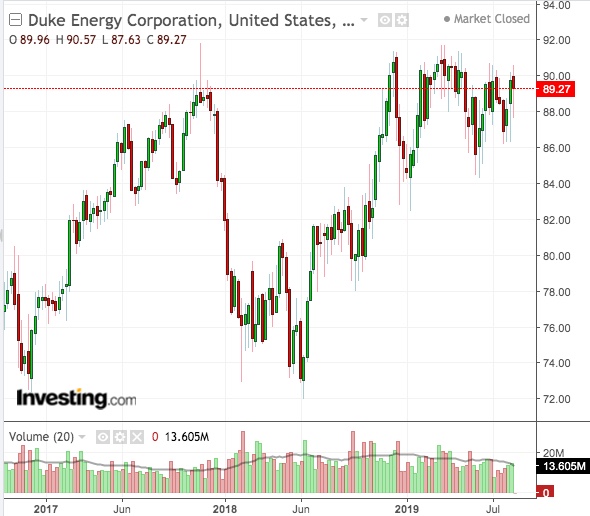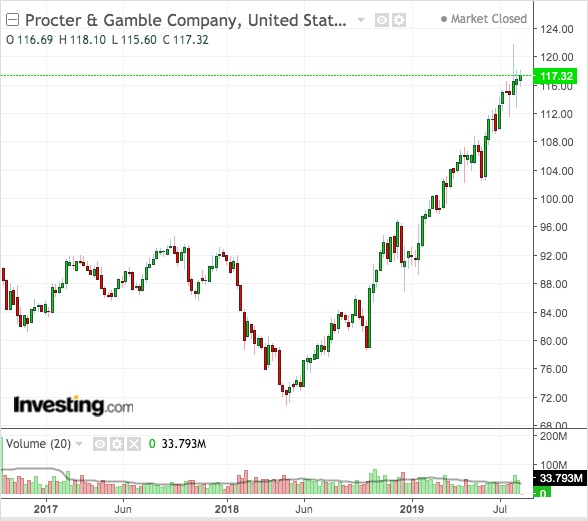The urge to sell your stocks and move on the sidelines is hard to resist when the word “recession” starts grabbing the headlines and the value starts plunging.
Wednesday was one such day when U.S. stocks suffered one of the deepest sell-offs of the year. The S&P 500 dropped almost 3% and the Dow Jones Industrial Average tumbled 800 points in its worst rout of the year.
While equities recovered mildly in Thursday's session, the underlying driver of the losses was more significant: What made investors believe recession might just be round the corner was a strong signal from the bond market, where 10-year Treasury notes briefly yielded less than 2-year Treasury notes.
This “inversion” of the yield curve is generally taken as a warning sign that the economy is about to slow down or contract. This fear is in the back of investors mind, especially after ten years of non-stop expansion since the global financial crisis.
But a recession, when and if it comes, doesn’t mean that every sector of the market will suffer. The good news is that Investors who have been building their income portfolio may get better opportunities to further add to their positions.
To help you better prepare for the possible recession, or a major economic slowdown, we have picked the following two dividend stocks that you can buy now to add some stability to your portfolio.
1. Duke Energy
Utilities are generally more stable stocks, as consumers will continue to need gas and electricity even the worst of economic contractions. That’s the reason why investors rush into utilities in times of uncertainty: these companies offer higher dividends and steady cash flows.

All charts powered by TradingView
In this space, we like Duke Energy (NYSE:DUK) due to its attractive dividend yield and diversified operations, which are well-positioned to produce steady cash flows.
The company has a $37 billion development plan to run until 2022 to support the company’s inflation-beating dividend growth.Through its diversified power, gas and storage businesses, Duke plans to deliver between 4% and 6% annual dividend growth.
The stock, which has gained almost 10% in the past 12 months, yields 4.24%. That translates into $0.945 a share quarterly dividend.
That kind of return will look quite juicy if we’re entering a persistently low-interest rate environment as indicated by the bond market—where the yield on the government 30-year bond has fallen below 2% for the first time on Aug. 14.
2. Procter & Gamble
Consumer staple is another area of the market where investors take refuge when the risk of a recession rises. The logic behind this move is simple: while cutting back spending on vacations and other luxury items, consumers are highly unlikely to stop buying toothpastes and dish-washing soap.

Procter & Gamble (NYSE:PG), the multinational consumer staple manufacturer, is a stock we recommend when volatility drives markets and investors seek slow but steady capital growth with regular dividend payments.
After a remarkable run of the past 12 months that sent PG stock soaring 44%, this name doesn’t come cheap. At 23, P&G’s forward price-to-earnings multiple is getting closer to the highest level in the past five years. But the company’s growth momentum suggests that shares of the maker of Bounty paper towels, Gillette razors, and Tide laundry detergent have still more room to run.
In its most recent earnings report in late July, P&G reported its best quarter of organic sales in more than a decade. Organic sales growth, which excludes items like acquisitions and currency effects, expanded a higher-than-expected 7% in P&G’s fiscal quarter, far surpassing last year’s 1% growth. The company beat its 4% organic-sales growth target for the fiscal year by a full percentage point.
Yielding 2.58% per annum, P&G pays $0.745 a share quarterly dividend which has been rising consistently.
Bottom Line
A recession is, no doubt, a time when prudent investors should reduce their risks and avoid investing in stocks whose fate is closely tied with economic growth. But if you’re a long-term investors aiming to generate passive income, any market downturn could present opportunities to buy solid dividend-paying stocks. Utilities and consumer staples are the two defensive areas of the market that could offer you this opportunity.
